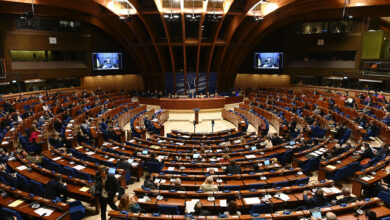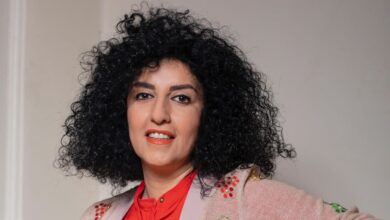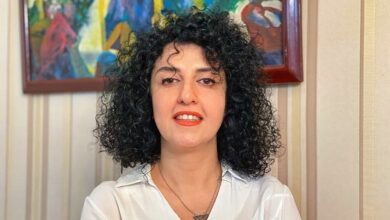It’s particularly telling that Khaled Saeed’s case has not yet been legally settled, despite the fact that it triggered a series of protests that helped lay the ground for the 25 January revolution. This revolution is still ongoing, and so is the establishment of a new political system.
Of course, no single political force can claim that it sparked the revolution. Nor can it (according to revolutionary legitimacy) confront all of the enemies of the revolution before the revolution has established its own legitimacy through a constitutional and legal framework.
If this were the case, the suspects in the Khaled Saeed case would have been the first to be punished by the revolution. The type of revolutionary legitimacy that has emerged is popular, and not centralized. It featured the constructive initiative to call for the January 25 protest through the “We are all Khaled Said” Facebook page, to which a large number of people responded positively. The protest developed spontaneously and independently of the original call and of any other body or group. This new type of legitimacy accompanied all stages of the revolution and remains in place.
This new legitimacy manifests itself most forcefully in the sites of popular mobilization for ongoing political demands. It is at its weakest, however, when it comes to issues that require political representation and negotiations over fine details.
In this context, it’s no coincidence that the trials of former regime figures, including those charged with torture like in the Saeed case, are taking a long time. It’s also not surprising that these trials are subject to ordinary legal procedures and judicial considerations that do not always lead to revolutionary verdicts.
This should not be discouraging as much as it should invite us to understand the nature of our revolution and the source of its strength and legitimacy: mass initiative and participation. Understanding that a revolution is incomplete and requires further energy and participation is necessary in order to achieve deeper changes in oppressive or corrupt authorities, which can in turn have deep effects on our social structure. This change could reach into deeper levels of the social structure, and lead people to revolt against themselves and shed oppression and corruption as they engage in an ongoing revolutionary struggle with any oppressive and corrupt authority.
Khaled Saeed’s case was transformed from the case of an individual’s murder (before the judiciary) to one with a much broader symbolism. This popular mobilization around the case originally involved mostly young people who sympathized with Saeed and viewed his assault as an attack on them. The power of the people has dictated the legitimacy of large-scale popular participation in the case.
The contradictory accounts regarding the death of a driver in Azbakeya a few days before the anniversary of Khaled Saeed’s death might not lead us to decisively settle legal responsibility. The popular protest that followed the driver’s death was fueled by anger directed at a larger case. The driver is simply a face for other members of the lower classes who have suffered repeatedly from police brutality amidst the silence of the upper classes. Members of the lower classes continue to be tried in military courts and used as scapegoats following any disturbances to public order. Some find themselves comforted when they see pictures of shabby-looking youngsters on newspapers and satellite channels being portrayed as “thugs” rather the “youth of the revolution”.
The return of the police and renewed attempts at law enforcement will result in a direct clash with the interests of those who are “outside the law”, like street vendors and other informal workers, especially if this return is not carried out according to sympathetic and locally-formulated social policies and procedures. Police have a responsibility to protect individuals from violence (rather than use violence), even if the individuals in questions are considered “dangerous” suspects.
The revolution is an adventure for the sake of freedom. Those who are alarmed by chaos want immediate stability at any cost. But the disorder that accompanies revolutions and transitional periods is the natural result of exposing a society’s contradictions. Those who dream of a better Egypt accept the adventure and its possibilities. They reject any infringement of citizens’ rights in the name of preserving stability and security.
What is most worrisome is not the fact that the Supreme Council of the Armed Forces (SCAF) is badly managing Egypt’s political affairs. In some ways, it may be reassuring to know that the military is not fit to engage in politics. Early elections should also be no cause for concern, for they are necessary to put our society at the heart of a democratic experience. Neither the people nor the political forces can be fully prepared for this experience except by becoming directly involved and confronting the various challenges associated with elections.
What is most worrisome is the SCAF’s impatience in dealing with the disturbances of the transitional period. This impatience drives it to tighten its grip on civil liberties and street politics, which are absolutely necessary in this critical political period. This paves the way for violations of the rights and dignity of citizens, including their mistreatment and the denial of fair civil trials. In its public statements, the military has routinely back-peddled on the question of detaining revolutionaries and trying them in military courts. At the same time, those who do not look like the “youth of the revolution” – educated and middle-class – do not have the same opportunities.
The figures from the old regime who repressed and killed many of Egypt’s revolutionaries were no demons. They simply protected what they believed was order and stability without regard for the rights and dignity of individuals, especially the rights of those on the margins of society.
But those who slept under the wheels of tanks in Tahrir Square on 28 January both resembled and did not resemble Khaled Saeed. They were caught between the fear that these tanks would move to undermine their revolution and the reassurance that they would not crush them. They challenged the curfew imposed by the military.
The military, on the other hand, is neither a revolutionary nor a counter-revolutionary force. It is a force that found itself confronted with a tough choice that it did not want to have to make. The “solid heart” of the revolution is those who went through the adventure and decided to either collectively face the fate of Khaled Saeed or collectively overcome it.
Human dignity belongs both to those who resemble and do not resemble Khaled Saeed. The big issue that follows on from that of Saeed relates to the foundation of the new regime, which will try to build a free and just society.
Absent human dignity, those who will remember Khaled Saeed today and stand again in all of Egypt’s squares on the anniversary of his death will not relent. They will spark anger for the sake of dignity once again.
Translated and abridged from the Arabic Edition




